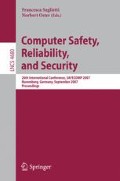Abstract
In future, the decreasing feature size and the reduced power supply will make it much more difficult to built reliable microprocessors. Economic pressure will most likely result in the reliability of microprocessors being tuned for the commodity market. In the dependability domain we expect the continued spreading of mixed-mode computing systems, i.e., systems that execute both critical and non-critical functionality. To permit the efficient execution of non-critical applications and the correct execution of critical applications, we introduce the concept of Software Encoded Processing (SEP). SEP enforces a crash failure semantics of the underlying CPU. It does not require the source code of encoded programs and provides probabilistic guarantees. To achieve this, arithmetic codes and signatures are used to detect corrupted data and faulty executions of programs.
Access this chapter
Tax calculation will be finalised at checkout
Purchases are for personal use only
Preview
Unable to display preview. Download preview PDF.
References
Bagchi, S., Kalbarczyk, Z., Iyer, R., Levendel, Y.: Design and evaluation of preemptive control signature (PECOS) checking. IEEE Trans. on Computers (2003)
Bernick, D., Bruckert, B., Vigna, P.D., Garcia, D., Jardine, R., Klecka, J., Smullen, J.: NonStop advanced architecture. DSN (2005)
Blum, M., Luby, M., Rubinfeld, R.: Self-testing/correcting with applications to numerical problems. In: Proceedings of STOC 1990, United States (1990)
Borkar, S.: Designing reliable systems from unreliable components: The challenges of transistor variability and degradation. IEEE Micro (2005)
Bossen, D.C., Tendler, J.M., Reick, K.: Power4 system design for high reliability. IEEE Micro (2002)
Carmichael, C.: Triple module redundancy design techniques for virtex series FPGA. Xilinx Application Notes 197 (March 2001)
Forin, P.: Vital coded microprocessor principles and application for various transit systems. In: IFA-GCCT (September 1989)
Huang, K.-H., Abraham, J.A.: Algorithm-based fault tolerance for matrix operations. IEEE Trans. Computers (1984)
Knauth, T.: Performance improvements of the vital encoded interpreter. Großer Beleg, Technische Universität Dresden (2006)
Li, X., Gaudiot, J.-L.: A compiler-assisted on-chip assigned-signature control flow checking. In: Asia-Pacific Computer Systems Architecture Conference. LNCS, Springer, Heidelberg (2004)
Mahmood, A., McCluskey, E.J.: Concurrent error detection using watchdog processors—a survey. IEEE Trans. Comput. (1988)
Miller, E.L.: UC Santa Cruz, School of Engineering, http://www2.ucsc.edu/courses/cmps111-elm/dlx/install.shtml
Nicolescu, B., Velazco, R.: Detecting soft errors by a purely software approach: Method, tools and experimental results. In: DATE 2003 (2003)
Oh, N., Mitra, S., McCluskey, E.J.: ED4I: Error detection by diverse data and duplicated instructions. IEEE Trans. Comput. (2002)
Patterson, D.A., Hennessy, J.L.: Computer architecture: a quantitative approach. Morgan Kaufmann Publishers Inc., San Francisco, CA, USA (1990)
Quach, N.: High availability and reliability in the Itanium processor. IEEE Micro (2000)
Spainhower, L., Gregg, T.A.: IBM S/390 parallel enterprise server G5 fault tolerance: A historical perspective. IBM Journal of Research (1999)
Stefanidis, V.K., Margaritis, K.G.: Algorithm based fault tolerance: Review and experimental study. In: International Conference of Numerical Analysis and Applied Mathematics (2004)
Wang, C., Kim, H.s., Wu, Y., Ying, V.: Compiler-managed software-based redundant multi-threading for transient fault detection. In: Proceedings of CGO 2007 (2007)
Wappler, U., Fetzer, C.: Hardware fault injection using dynamic binary instrumentation: FITgrind. In: Proceedings Supplemental, vol. EDCC-6 (October 2006)
Wappler, U., Fetzer, C.: Hardware failure virtualization via software encoded processing. In: INDIN 2007 (2007)
Wasserman, H., Blum, M.: Software reliability via run-time result-checking. J. ACM (1997)
Author information
Authors and Affiliations
Editor information
Rights and permissions
Copyright information
© 2007 Springer-Verlag Berlin Heidelberg
About this paper
Cite this paper
Wappler, U., Fetzer, C. (2007). Software Encoded Processing: Building Dependable Systems with Commodity Hardware. In: Saglietti, F., Oster, N. (eds) Computer Safety, Reliability, and Security. SAFECOMP 2007. Lecture Notes in Computer Science, vol 4680. Springer, Berlin, Heidelberg. https://doi.org/10.1007/978-3-540-75101-4_34
Download citation
DOI: https://doi.org/10.1007/978-3-540-75101-4_34
Publisher Name: Springer, Berlin, Heidelberg
Print ISBN: 978-3-540-75100-7
Online ISBN: 978-3-540-75101-4
eBook Packages: Computer ScienceComputer Science (R0)

